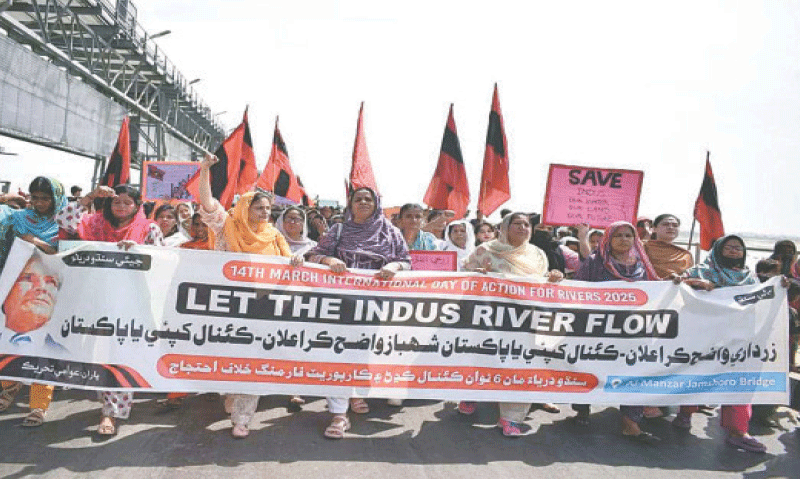Protests over Pakistan’s controversial canal projects block major trade routes for sixth day
Protests across Sindh have left 20,000 goods and oil trucks stranded, crippling transport routes
Business Desk
The Business Desk tracks economic trends, market movements, and business developments, offering analysis of both local and global financial news.

Protests against a controversial federal canal project in Pakistan’s Sindh entered their sixth day on Wednesday, crippling trade routes and leaving approximately 20,000 goods and oil tankers stranded across the province.
Highway blockades organized by political and social groups, including the Karachi Bar Association and Sindh High Court Bar Association, have paralyzed commercial transport. The sit-ins began April 18 near Baberloi in Khairpur district and have since expanded to key points like Rohri and Ali Wahan.
The protesters are demanding a halt to the federal government’s plan to build six new canals from the Indus River.
The project, allegedly approved by President Asif Ali Zardari in July 2024—a claim he later denied—has sparked backlash in Sindh over concerns of water rights and provincial autonomy.
Daily movement of around 500 oil tankers from Karachi’s oil depot to Punjab and Khyber Pakhtunkhwa has stopped entirely. According to the Oil Companies Advisory Council (OCAC), some 800 tank lorries are now stuck in the Sukkur–Larkana region, raising the specter of fuel shortages.
"Fuel stocks remain stable for now," the OCAC said in a letter to the Chief Secretary Sindh, "but without alternate routes, continued disruption will lead to shortages across the province."
KCCI warns disrupting causing ‘severe damage’
The Karachi Chamber of Commerce & Industry (KCCI) warned that the ongoing disruption is causing severe damage to the economy.
“The entire supply chain stands paralyzed due to the road closures,” said KCCI President Jawed Bilwani. “Containers and cargo vehicles are stuck in long queues, and time-sensitive shipments—especially perishable goods—are suffering major delays.”
Bilwani said about 18,000 goods transport vehicles are stranded, many carrying factory inputs, grains, livestock, and food items needed for the upcoming Eid holiday. The Fruit and Vegetables Association confirmed that 250 to 300 containers of export-bound potatoes are beginning to spoil.
“There is no supply of fruits, vegetables, or meat to Karachi,” the association said, adding that shipments bound for the Middle East and Far East are at risk of being rejected.
Bilwani expressed support for peaceful protest but urged authorities to act quickly.
“This is not only hurting businesses and industries but also jeopardizing employment and trade at a time when the country is already facing serious economic challenges,” he said.
He called on both federal and provincial governments to initiate dialogue with protest leaders and restore traffic flow.
“We appeal for an immediate resolution,” Bilwani said. “Every hour of inaction is costing the country—its economy and its people.”
The federal government has maintained that no province’s water rights are being compromised. On April 21, Prime Minister’s adviser Rana Sanaullah announced plans to open talks, but so far, no breakthrough has been reported.
Political tensions have intensified within the ruling coalition. On April 18, Pakistan Peoples Party Chairman Bilawal Bhutto-Zardari threatened to leave the federal alliance if the canal projects weren’t scrapped, calling them a direct threat to Sindh.
The protests have highlighted cracks within the Pakistan Muslim League-Nawaz and PPP partnership, already strained by unresolved power-sharing disputes in Punjab.
OICCI express concerns
Meanwhile, the Overseas Investors Chamber of Commerce and Industry (OICCI) voiced serious concerns over the financial toll of the protests, warning that continued disruption risks long-term damage to Pakistan’s economy and credibility as a trading partner.
“Uninterrupted trade is vital to safeguard export competitiveness and promote economic stability,” the OICCI said in a statement, urging immediate action from both provincial and federal authorities.
According to the chamber, more than 3,500 vehicles—many loaded with perishable goods, export consignments, and critical industrial inputs—remain stranded near Sukkur. The prolonged halt is already creating market shortages, with fears growing of production shutdowns in multiple provinces due to raw materials stuck at Karachi Port.
“This disruption has fractured essential supply chain linkages,” the OICCI said, adding that exporters are now missing international delivery deadlines, damaging Pakistan’s reputation as a reliable supplier and putting future contracts at risk.
If left unresolved, the chamber warned, the crisis could lead to widespread operational shutdowns, job losses, and a costly, prolonged recovery.
The OICCI expressed confidence that authorities recognize the urgency and will act swiftly to reopen key highways and restore the movement of goods.







Comments
See what people are discussing